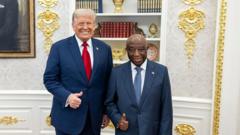The president seeks to influence Brazil's treatment of former leader Jair Bolsonaro through potential tariffs, drawing scrutiny regarding the legality of such actions.
**Trump's Tariff Threat to Brazil Raises Legal and Political Questions**

**Trump's Tariff Threat to Brazil Raises Legal and Political Questions**
President Trump's warning of steep tariffs on Brazil has sparked concerns over the use of trade powers in political disputes.
President Trump has long utilized tariffs as a significant instrument for increasing revenue and enhancing American manufacturing. Recently, he has escalated the use of this tool in a unique way by aiming to influence political dynamics in Brazil. This week, he threatened to impose a staggering 50 percent tariff on Brazilian exports starting August 1, signaling an unusual intertwining of trade policy and foreign political matters.
Trump linked the potential tariff to Brazil's controversial treatment of former president Jair Bolsonaro, who currently faces allegations of attempting to commit a coup following a loss in the 2022 elections. Trump characterized the legal proceedings against Bolsonaro as a "Witch Hunt," demanding that Brazilian courts reconsider their stance on the former president or face harsh trade repercussions.
This recent tactic sparked a debate among legal experts regarding the scope of the president's authority to levy tariffs for reasons that appear to be politically motivated. While Congress typically holds the power to impose import taxes, the president does possess limited authority to act independently, particularly for national security. However, the application of tariffs for political leverage, as exemplified in this case, is under scrutiny.
Moreover, Trump misrepresented the economic rationale for the impending tariffs by mistakenly asserting that the U.S. has a trade deficit with Brazil, when in actuality, American exports to Brazil exceed imports. This discrepancy raises further questions about the legitimacy and intent behind his tariff threat, indicating a deeper confluence of trade and political maneuvering on the international stage.





















